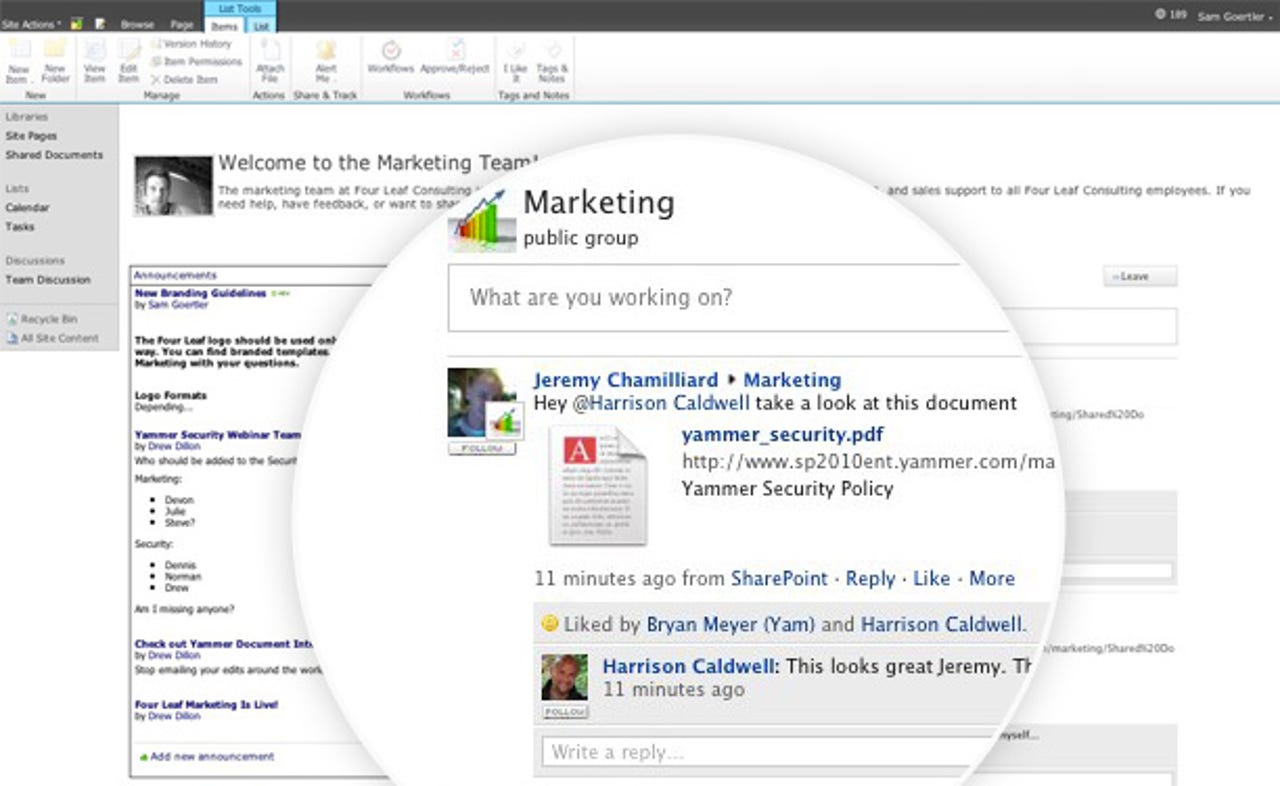Microsoft buys Yammer to succeed in its social enterprise efforts

So the coffee shop rumours were true. This week Microsoft confirmed that it has acquired Yammer for $1.2 billion in cash. It certainly is impressive that Yammer, which started in September 2008 has built its business up to be sold less than four years later for such a sum.
This will be good for social business customers -- especially for current Microsoft customers who want to embrace the social enterprise.
Yammer will join the Office division bringing the ‘Enterprise social network’ to Microsoft. It will remain a stand alone service and will operate alongside SharePoint, Office 365, Dynamics and Skype.
Yammer will continue under the direction of CEO and founder, David Sacks. Microsoft has committed to ‘maintain Yammer’s brand, product and business model’ says Maria Ogneva, Head of Community at Yammer.
Social enterprise
But there is still a lot of work to do for Microsoft to build its social enterprise offering.There are two main components that need to be combined: the social networking, social conversation side of Yammer and the structured workflow process that well implemented SharePoint installations can provide.
Implementing Facebook-like tools for the enterprise requires a good communications plan with optimised operational procedures implemented in a structured way. Will this acquisition be the glue that binds the disparate parts together?
Microsoft has obviously been looking for a platform that is social in its nature, and with the integration of Yammer into the Office division and a focus on cloud service through Office 365, it is going a long way towards achieving its aims.
In order to have a truly collaborative platform, a tool like Yammer can enable collaboration and conversation. The challenge that Microsoft faces is that Office as a tool is fragmented. Products such as Excel and Word are still used mainly in isolation.
Knowledge workers currently work with different templates or documents to get their work done. Workflow, CRM or sales process all require a set of structured applications that may or may not suit the preferred way of working.
Unstructured conversations
Yammer encourages social conversations based on the knowledge of the workforce, but traditional enterprise pieces such as budget, process and executive level buy-in need to be put into place to bring these components together.This is where tools such as SharePoint come into play. Yammer will bring unstructured conversations to structured workflow as companies implement the social enterprise.
According to Avinoam Nowogrodski, CEO of Clarizen, this move will bring Microsoft into direct competition with Salesforce.com. Nowogrodski says that the Yammer engine will ‘incentivise conversations based on knowledge with SharePoint offering the back end process and workflow’.
Socially structured
Tommy Ahlers, CEO of the collaborative work platform Podio, acquired by Citrix in April 2012 reckons that the acquisition is a big thing for the industry.Ahlers says that Yammer is a ‘strong tool for talking about work, but businesses actually need to get work done’. Yammer is a true SaaS play – easy to implement and roll out, but is it what the market wants?
Cloud offerings, simple to implement in organisations are currently a big bet for software companies such as IBM, Salesforce, Amazon and Microsoft.
Although Yammer can quickly go viral within a company, Microsoft needs to leverage this to create socially structured workflow processes. Empowered employees can do this for themselves.
Knowledge workers across enterprises can become their own ‘citizen developers’ says Ahlers. These developers create their own workflow systems using Excel or Word using macros or through visual basic.
Companies such as Salesforce and Podio give the user the ability to simply create their own apps and customise their workflow to suit them. Allowing users to build the tools empowers them to make better business decisions and streamline internal processes.
'Legitimate concerns'
Some companies are less enthusiastic about the acquisition. CEO of eXo, Benjamin Mestrallet one of Yammer's competitors reckons that:'Yammer has been very successful at attracting individual users, but they’ve continued to struggle at the enterprise level, where IT organizations still have legitimate concerns about security, integration and manageability. Microsoft is willing to spend 1.2 billion dollars to play catch-up in this space'.
With Yammer customers currently at over 85 per cent of the Fortune 500, and Microsoft's collaboration and security offerings, the marriage of Microsoft and Yammer could turn out to be mutually beneficial for anyone considering social enterprise adoption.
Related content:
- Why a Microsoft buy of Yammer would be good for social business
- Three more reasons Microsoft might buy Yammer
- Microsoft buys Yammer for $1.2 billion
- Microsoft acquires Yammer as social enterprise war escalates
- Microsoft, Yammer and the land grab- Social enterprise lunacy
- Microsoft to marry Yammer
- Microsoft officially acquires Yammer for $1.2 billion
- Will Yammer improve SharePoint?
